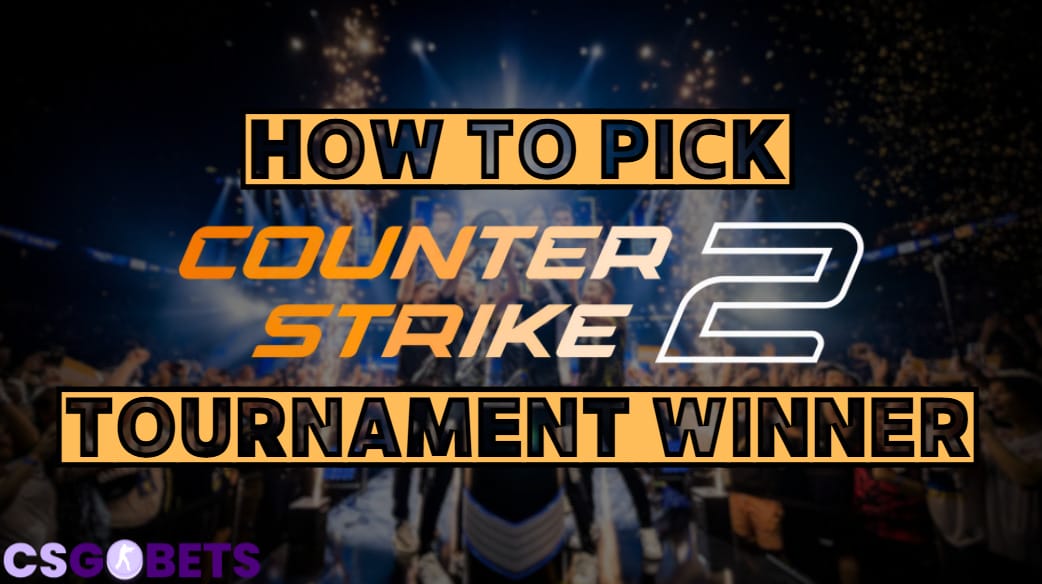In the realm of competitive gaming, accurately predicting the winner of a CS2 tournament requires a meticulous and analytical approach. This article aims to provide readers with a strategic framework for making informed decisions in selecting the tournament champion.
By delving into the tournament structure, team performance, individual player skills, and various other factors, we will equip readers with the knowledge and tools necessary to navigate the dynamic world of CS2 tournaments and increase their chances of choosing the ultimate victor.



There are no available offers for your location 😢 Use VPN with another location if you would like to bet 😼
Understanding the CS2 Tournament Structure
To accurately predict a CS2 tournament winner, it is imperative to have a comprehensive understanding of the intricacies of the CS2 tournament structure.
The CS2 tournament structure is designed to test teams’ skills, strategies, and adaptability. It typically consists of multiple stages, starting with the group stage where teams compete against each other in a round-robin format.
The top teams from each group then advance to the playoffs, which may include single-elimination matches or a double-elimination bracket. Understanding the format allows analysts to assess each team’s performance objectively and identify their strengths and weaknesses.
Factors such as map selection, team composition, and tactical decision-making play crucial roles in determining the outcome of matches. By analyzing the tournament structure, one can make informed predictions and increase the chances of selecting the eventual CS2 tournament winner.
Analyzing Team Performance and Rankings
Teams’ performance and rankings can be analyzed to determine their potential for success in a CS2 tournament. When analyzing team performance, it is important to consider several key factors.
Firstly, examining a team’s win-loss record can provide insight into their overall success rate.
Additionally, assessing individual player statistics such as kill-death ratio, objective captures, and accuracy can help gauge a team’s overall skill level.
Evaluating a team’s performance in previous tournaments and their ability to adapt to different game modes and maps can also be indicative of their potential success.
Moreover, considering a team’s ranking within the competitive scene can provide an understanding of their standing among other top-tier teams.
Evaluating Individual Player Skills and Performance
When evaluating individual player skills and performance, it is crucial to assess various factors that contribute to their overall effectiveness in a CS2 tournament.
Firstly, analyzing their technical abilities is essential. This includes their accuracy, reaction time, and game mechanics proficiency.
A player’s map knowledge and strategic thinking are also crucial. Understanding the layout of the game and making effective decisions can greatly impact their performance.
Additionally, teamwork and communication skills should be evaluated. A player who can effectively coordinate with their teammates and communicate important information can greatly enhance their team’s chances of success.
Lastly, mental resilience and adaptability are vital. The ability to stay focused, handle pressure, and adjust strategies based on the changing dynamics of the game are key indicators of a player’s overall effectiveness.
Researching Team Strategies and Playstyles
Continuing the evaluation of individual player skills and performance, it is essential to delve into researching the team’s strategies and playstyles. Understanding how a team operates as a unit and their preferred tactics can provide valuable insights into their overall performance. Here are three key aspects to consider when researching team strategies and playstyles:
- Composition: Analyze the team’s preferred composition of players and their roles within the game. This includes understanding the distribution of roles such as entry fragger, support player, and in-game leader, as well as their synergy and coordination.
- Tactical Approaches: Study the team’s tactical approaches, including their map control, execution strategies, and rotations. Assess their ability to adapt to different situations and their overall game sense in terms of decision-making.
- Playstyle Adaptability: Evaluate the team’s adaptability to different playstyles. Some teams excel at aggressive, high-risk strategies, while others prefer a more passive, methodical approach. Understanding their adaptability can help predict their performance against different opponents.
Studying Historical Match Data and Patterns
To further enhance your analysis of a CS2 tournament winner, it is imperative to delve into the realm of studying historical match data and patterns. By examining past matches, you can identify trends, strategies, and playstyles that have proven successful in the past.
This analytical approach allows you to gain valuable insights into the strengths and weaknesses of different teams and players. By studying historical match data, you can identify patterns in team compositions, map choices, and tactical approaches. This knowledge can help you make informed predictions about future matches and identify teams that have consistently performed well in specific situations.
Additionally, analyzing historical data allows you to understand how teams have adapted their strategies over time, giving you a strategic advantage in predicting their future moves.
Keeping up With the Latest Meta and Patch Updates
Building upon the analysis of historical match data and patterns, it is crucial for CS2 tournament enthusiasts to stay updated with the latest meta and patch updates. The ever-evolving nature of the game requires players to adapt their strategies and team compositions accordingly.
To effectively keep up with the latest meta and patch updates, players should consider the following:
- Follow professional players and teams: Keeping an eye on the top players and teams in the CS2 scene can provide valuable insights into the current meta. Analyzing their playstyles, team compositions, and strategies can help in understanding the current trends.
- Stay updated with patch notes: Patch updates often introduce balance changes, new features, and adjustments to game mechanics. By thoroughly reading and understanding the patch notes, players can anticipate shifts in the meta and adapt their strategies accordingly.
- Participate in community forums and discussions: Engaging in discussions with other players and enthusiasts can provide different perspectives and insights. Sharing ideas, strategies, and experiences with like-minded individuals can help in staying ahead of the meta and understanding its nuances.
Considering External Factors and Variables
When considering external factors and variables for picking a CS2 tournament winner, it is important to analyze the impact of outside influences on team performance. These factors can range from the team’s previous tournament experience to the current state of the esports industry. By taking these variables into account, you can make more informed decisions when predicting the outcome of a CS2 tournament.
To illustrate the importance of considering external factors, let’s analyze three key variables in a table format:
| External Factor | Impact on Team Performance | Considerations |
|---|---|---|
| Tournament Experience | Teams with more experience may have an advantage | Look for teams that have consistently performed well in previous tournaments and have a strong track record of success. |
| Patch Updates | Changes to game mechanics can affect team strategies | Keep track of recent patch updates and analyze how they may impact team compositions and gameplay strategies. |
| Esports Industry | Shifts in popularity and fan support can influence team morale | Consider the current state of the esports industry, including the popularity of CS2 and the level of fan support for different teams. |
Utilizing Data Analysis Tools and Resources
By harnessing the power of data analysis tools and resources, tournament organizers can gain valuable insights into team performance and make more informed decisions when selecting a CS2 tournament winner. Data analysis allows for a deeper understanding of the gameplay, strategies, and overall performance of each team.


